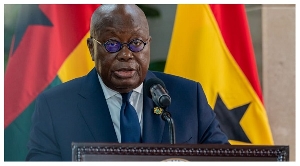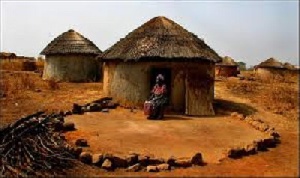- Home - News
- TWI News | TV
- Polls
- Year In Review
- News Archive
- Crime & Punishment
- Politics
- Regional
- Editorial
- Health
- Ghanaians Abroad
- Tabloid
- Africa
- Religion
- Election 2020
- Coronavirus
- News Videos | TV
- Photo Archives
- News Headlines
- Press Release
Opinions of Monday, 6 December 2010
Columnist: Bokor, Michael J. K.
The NDC and NPP in kettle-and-pot politics
By Dr. Michael J.K. Bokor
E-mail: mjbokor@yahoo.com
December 5, 2010
For good or bad, Ghanaian politicians don’t hesitate to deride each other as incompetent. When they do so, they draw attention to themselves as objects of pity because unknown to them, they are equally guilty of the very flub that they find in others to condemn. Of late, functionaries of both the NDC and the NPP have expended energy, trading accusations of incompetence that serve no useful purpose.
Of all this political horse-trading, none has piqued me as much as the one provoked by the NPP MP for Fanteakwa in the Eastern Region, Kwabena Amankwah Asiamah. He is reported as pointing gossiping fingers at the NDC government over current happenings in the country to conclude that “the ruling National Democratic Congress (NDC) party least expected to win the 2008 general elections and, as a result, is suffering from a condition known as “pathological transfiguration governance stress syndrome.”
Pathological transfiguration governance stress syndrome? A true instance of big English, indeed!! This can only come from someone who belongs to the group boasting that they are the “intellectuals” of Ghana politics. Empty big words for nothing. And an expensive joke that falls flat on its face.
In the Shakespearean sense, this MP is pitiable because he is nothing but “a foolish wit.” He is yet to become “a witty fool” and do better than playing the buffoonery by rushing to cast the first stone. Sadly, politicians of this NPP MP’s type are all over the place—and they cheapen themselves to make Ghanaian politics look obnoxious.
Truth be told, neither the NPP nor the NDC can claim to be better than the other in terms of governance to solve the country’s problems. They are just two black sides of one coin. Both can be either the kettle or the pot, depending on how they appear to the observer at one time or the other. Why then should one attempt calling the other BLACK?
My conclusion is simple: Putting aside the Rawlings era (for its obvious inadequacies), there is no vast difference in governance between Kufuor’s NPP administration and the Mills-led NDC one. The similarities are too common:
i. Their economic policies are the same, influenced by the IMF/World bank conditionalities and supported by panhandling for loans; no clear-cut policy directives and implementation of ad hoc measures that don’t solve the country’s systemic problems
ii. Huge government apparatus (Ministers, Deputy Ministers, Special Assistants, Spokesmen, countless political appointees, etc.) and astronomical overhead expenditure on them, which doesn’t bring in any tangible benefits to the economy
iii. Lukewarm attitude to tackling the problems of the industrial and agricultural sectors, which has worsened the unemployment situation and raised the crime wave
iv. Over-dependence on traditional sources of revenue generation and imposition of stiff taxes and high utility bills to worsen living conditions
There are some marked differences, though:
i. To all intents and purposes, Kufuor gave a preferential treatment to the Asantehene and Manhyia Palace and clearly practiced tribalism, cronyism, and discrimination in appointments to high public offices. The Mills government has shied away from that approach but lacks the political will to deal with hooliganism among party functionaries, which has unleashed mayhem on the society
ii. Kufuor’s government practised vindictiveness in politics to deepen the gulf between political rivals while the Mills-led administration is hamstrung, not knowing what to do to stamp its authority on the situation, which seems to have emboldened the NDC’s opponents to the disadvantage of Mills himself.
So, what is the fuss about an NDC government’s being labelled as “transmogrified,” whatever that fluff may mean? Indeed, considering the events that shot the NPP out of power and ushered in the NDC, one can confirm that although the Kufuor-led government might praise itself over its so-called accomplishments, they mean not as much to the Ghanaian as the NPP members will want us to believe. Otherwise, why did the voters turn away from the NPP at the 2008 elections?
Events in the Mills era are reminiscent of what happened under Kufuor, although Kufuor’s first two years in office had their own peculiarities, shrouded in scandals as well:
• Kufuor’s dash to Lome to commiserate with Eyadema, the Togolese murderer, while condemning military adventurism in Ghanaian politics—wining and dining with a distant devil, yet condemning other devils in his own backyard.
• Kufuor’s stealing of 41 million Cedis from the national coffers to rehabilitate his private residence in the Airport Residential Area in Accra; unaccounted-for spending of billions of Cedis on untendered contracts to renovate the Osu Castle
• Launching of Ghana into the HIPC and the dissipation of resources therefrom; shady deals (such as the Sahara Oil deal and the millions of Dollars that the Asantehene collected from the World Bank/IMF with the Kufuor government’s backing)
• Immorality in high places—wife-snatching by Kufuor’s appointees (Thomas Broni and co.); drug-trafficking with official blessing
• Avid greed on the part of Kufuor—the Hotel Kufuor saga; tribal politics and appointment into public office of Kufuor’s family members, friends, and other cronies
• Hounding of political opponents and corruption of the state apparatus.
These scandals are still fresh in our minds and don’t speak of a government that should be described as better than its successor. The Kufuor government might be claiming credit for development projects but its legacy of corruption, immorality, looting of state property (lands, vehicles, bungalows, etc.), and a weak economy does not justify that credit.
The Mills-led administration has also reaped a harvest of scandals even though most of them have ended up being mere hot air being blown by political opponents who did not conduct proper investigations to verify rumours before airing them as “truths” to be believed without question. The fact that both administrations can’t avoid scandals tells me that the rot in the system is too thick for comfort. If our politicians can help us clean the stables, we should plug all the loopholes and prevent such scandals. But will they? No!! Doing so will take food out of their own mouths—and they can’t do without that food.
For me, the larger real issues lie in how the electorate are fooled by these politicians who indulge in nothing but plain negative propaganda to seek favour. This over-zealous NPP MP is a clear example of such misguided politicians who use duplicity to advantage.
Despite all the ugly noise about ushering the country into a middle-income bracket, nothing has changed for the better to give the people any relief. In the meantime, the politicians continue to award themselves with privileges while those who put them in office wallow in abject poverty, disease and want.
Again, considering what the Mills-led government has been doing (or what it has failed to do) so far, there is no doubt in my mind that it is sowing the seeds of its own destruction at the polls. This government doesn’t seem to be doing things in any different manner from what Ghanaians are already familiar with.
The intriguing aspect of this flat joke is that it has come from an MP who is not even known in any way as actively doing anything to uplift the living standards in his constituency nor does he contribute anything productive to deliberations in Parliament. But for this stale joke, some of us won’t even have known that he exists.
I want this MP to tell us what he has used the MP’s share of the Common Fund to provide for his constituents to show that he is interested in their well-being. But for the voting on ethnic lines, I don’t think this Asiamah could be an MP.
While he is poking this fun at the NDC, Kofi Wayo storms the scene from another angle with his blistering attack on the NPP hierarchy as “wicked” people. His own words speak volumes:
“…They brought all their cronies, taxi drivers, horse teeth cleaners; they made them ministers to rip the country off.”
Nothing can be more pointed than this claim by someone who had been in the thick of affairs in the NPP to outdo the NDC in the 2000 and 2004 elections before de-camping. Although Kofi Wayo has his personal problems with the NPP, what he says carries weight as far as my understanding of the NPP’s political motives is concerned.
We expect our politicians to go beyond pettiness and to use the people’s mandate for better purposes. While they have too much time and find too little to do, the people’s living conditions continue to worsen. Solving their problems doesn’t have to depend on flat jokes of Asiamah’s type.










